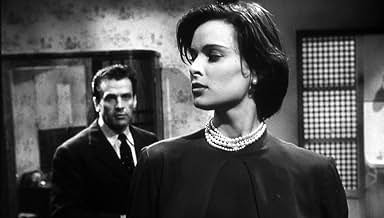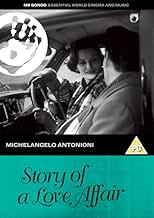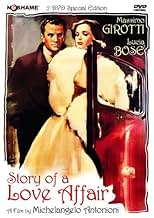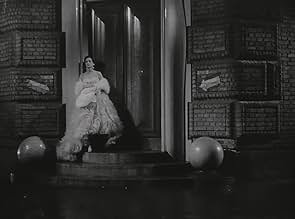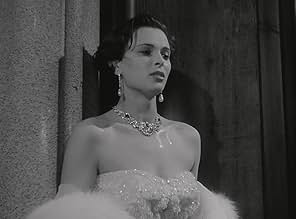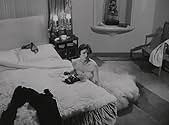PUNTUACIÓN EN IMDb
7,1/10
3,5 mil
TU PUNTUACIÓN
Añade un argumento en tu idiomaPaola is a young, beautiful woman married to a wealthy entrepreneur. She meets her former lover Guido after seven years, but their relationship is marked by tragic events.Paola is a young, beautiful woman married to a wealthy entrepreneur. She meets her former lover Guido after seven years, but their relationship is marked by tragic events.Paola is a young, beautiful woman married to a wealthy entrepreneur. She meets her former lover Guido after seven years, but their relationship is marked by tragic events.
- Premios
- 2 premios y 1 nominación en total
Rubi Dalma
- L'amica snob di Paola
- (as Rubi D'Alma)
Rosi Mirafiore
- La cameriera del bar
- (as Rosi Mirafiori)
Franco Fabrizi
- Il presentatore della sfilata di moda
- (sin acreditar)
Argumento
¿Sabías que...?
- CuriosidadesMichelangelo Antonioni's feature film directorial debut. He wanted to cast Gene Tierney as Paola, but since he was an unknown European director he could not get her. Eventually he met then 19 year old Lucia Bosè, who had been Miss Italy 1947, while having lunch at fellow director Luchino Visconti's house. While initially skeptical over her maturity, Visconti convinced him to audition her.
- PifiasAfter Paola says, "Leave me alone," the camera moves to follow her as she collapses onto her bed. In the upper right corner of the frame, a white drape can be briefly seen before it is pulled out of the path of the camera.
- ConexionesFeatured in Las películas de Marco Ferreri (2008)
Reseña destacada
Suffering is an inate response to life, this is one of the inescapable principles of existence. Antonioni saw far in the career that followed, farther than perhaps any director in cinema, but here he begins where it's proper, with life as a cycle of suffering, a seemingly random pattern of recurring time where we're denied what we most desire, happiness eludes us and our dreams and hopes are thwarted and frustrated.
Too young to see a true reality, Antonioni nonetheless sees clearly the reality of illusions. First that the cycle we call life is not blindly, randomly spun, and that we're to be held accountable for our part in the spinning, foremostly that our pursuit of happiness as we like to think is really the deluded pursuit of satisfying desire.
The crucial point that connects these is, rather poignantly, a death, and it happens not once but twice, mirrored identical the second time like a prefiguration of Vertigo. As with Vertigo, this borrows the world of film noir to speak of karmic wheels and the mechanisms that control them, a Double Indemnity scenario where secret lover and wife calculate to get rid of the rich husband.
In a magical touch, the plotted murder happens of its own accord, seemingly out of the whim of an agent of a higher court passing by.
It's not then just a matter of what begins as thought and desire invariably manifests in imminent reality, this is a powerful inspection of mind, but moreover that having devoted themselves by all means to the pursuit of that desire, a passion born of ego and craving, the obstacle that stood in their way now removed, the two protagonists realize how impotent they remain to pursue that desire, how desire is by its nature an insatiable attribute. Their punishment, which is not divine but of their own doing, is the toll exacted on their conscience.
This first appearance in Antonioni of karma as the force that keeps going the cycle of suffering is not perfect by any means, it seems at the same time to imply questions of moral order, whether or not for example wishing for a crime to happen is a crime in itself, spiritual in nature. And all of this is more verbose than need be, something Antonioni would excise in a few years.
We find things in this debut that Antonioni would elaborate upon in wonderful ways, the ineffability of connection, the city as a cold, alienating limbo where souls in transit struggle for meaning, the transparent reality that extends outside the frame to suggest an entire world and flow of life with or without these characters (indeed we find here, abetting this, the beginnings of his amazing sound work, where the city traffic is always audible), but all these are in nascent form here.
What stands out for me is the true perception that begins to form in Antonioni's cinema. Meaning our idea of reality is just that, an idea born of our own habits and various storytellings, which clouds our soul and needs to be challenged, dismantled, removed from our eyes so that we can see life as it is.
Too young to see a true reality, Antonioni nonetheless sees clearly the reality of illusions. First that the cycle we call life is not blindly, randomly spun, and that we're to be held accountable for our part in the spinning, foremostly that our pursuit of happiness as we like to think is really the deluded pursuit of satisfying desire.
The crucial point that connects these is, rather poignantly, a death, and it happens not once but twice, mirrored identical the second time like a prefiguration of Vertigo. As with Vertigo, this borrows the world of film noir to speak of karmic wheels and the mechanisms that control them, a Double Indemnity scenario where secret lover and wife calculate to get rid of the rich husband.
In a magical touch, the plotted murder happens of its own accord, seemingly out of the whim of an agent of a higher court passing by.
It's not then just a matter of what begins as thought and desire invariably manifests in imminent reality, this is a powerful inspection of mind, but moreover that having devoted themselves by all means to the pursuit of that desire, a passion born of ego and craving, the obstacle that stood in their way now removed, the two protagonists realize how impotent they remain to pursue that desire, how desire is by its nature an insatiable attribute. Their punishment, which is not divine but of their own doing, is the toll exacted on their conscience.
This first appearance in Antonioni of karma as the force that keeps going the cycle of suffering is not perfect by any means, it seems at the same time to imply questions of moral order, whether or not for example wishing for a crime to happen is a crime in itself, spiritual in nature. And all of this is more verbose than need be, something Antonioni would excise in a few years.
We find things in this debut that Antonioni would elaborate upon in wonderful ways, the ineffability of connection, the city as a cold, alienating limbo where souls in transit struggle for meaning, the transparent reality that extends outside the frame to suggest an entire world and flow of life with or without these characters (indeed we find here, abetting this, the beginnings of his amazing sound work, where the city traffic is always audible), but all these are in nascent form here.
What stands out for me is the true perception that begins to form in Antonioni's cinema. Meaning our idea of reality is just that, an idea born of our own habits and various storytellings, which clouds our soul and needs to be challenged, dismantled, removed from our eyes so that we can see life as it is.
- chaos-rampant
- 24 abr 2011
- Enlace permanente
Selecciones populares
Inicia sesión para calificar y añadir a tu lista para recibir recomendaciones personalizadas
- How long is Story of a Love Affair?Con tecnología de Alexa
Detalles
Taquilla
- Recaudación en todo el mundo
- 528 US$
- Duración1 hora 38 minutos
- Color
- Relación de aspecto
- 1.37 : 1
Contribuir a esta página
Sugerir un cambio o añadir el contenido que falta

Principal laguna de datos
By what name was Crónica de un amor (1950) officially released in India in English?
Responde

